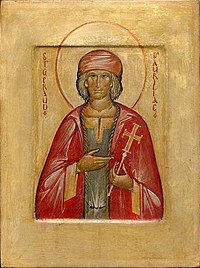Gerald of Aurillac
Saint Gerald of Aurillac | |
|---|---|
 Saint Gerald of Aurillac | |
| Confessor | |
| Born | c. 855 Aurillac |
| Died | c. 909 Cenezac |
| Venerated in | Catholic Church Eastern Orthodox Church |
| Major shrine | Aurillac |
| Feast | October 13 |
| Patronage | bachelors, counts, disabled people, Upper Auvergne |
Gerald of Aurillac (or Saint Gerald) (c. 855 – c. 909Roman Catholic Church, also recognized by other religious denominations of Christianity.
Gerald was born into the
Cesarius of Arles among his forebears,[2] though the title "Count of Aurillac" was not held by his father, to whose estates he succeeded, and was assumed by him in later life.[3] The details of his life known today come primarily from The Life of St. Gerald of Aurillac (c. 930–931) written by Odo of Cluny.[4]
Writing twenty years after the event, Abbot Odo of Cluny described how William, duke of Aquitaine, had entreated Gerald to abandon the militia regia, the feudal service performed directly to the king and pay homage to himself, "for the sake of love".[5] Gerald resisted, having recently assumed the title of comes and doubtless preferring to owe his fealty to the more distant liege, the king at Paris.[6]
According to Odo, Gerald suffered an illness as a child, sufficient in duration to advance his reading, and may have been disfigured by
Bishop of Rodez, on the grounds that with his social position he could do more good by remaining in the world as a layman. Nevertheless, secretly tonsured under his habitual cap, he consecrated his life in service to God, gave away his possessions, took a personal vow of chastity and prayed the breviary each day.[8]
He founded a church and abbey on his estate of Aurillac, where he was buried after dying at Cezeinac/Cézerniac,Upper Auvergne.[10]
References
- ^ Dates in Sitwell 1958:94 note 2
- ^ According to Odo of Cluny, (Sitwell 1958:90) noted in Derek Baker, "'Vir dei'", in G. J. Cuming and Derek Baker, eds. Popular Belief and Practice: papers read at the ninth summer meeting (Ecclesiastical History Society) 1972:43 note 8.
- ^ Sitwell points out there was no count of Aurillac before or after him. (Sitwell 1958:122); Odo's favore comitis nuper usurpato "could bear a stronger translation", Baker notes (Baker 1972:44 note 3).
- ^ G. Sitwell, tr. in St Odo of Cluny, 1958:90–180; there are two Latin versions of Odo's Life: A. Poncelet, "La plus ancienne 'Vie de Saint Géraud", Ann. Bolandist, 14 (1895:83–105).
- ^ Georges Duby, France in the Middle Ages 987–1460, 1993:28, notes that this sheds light on the process by which political institutions, at the low point of the monarchy, were locally reinvigorated.
- ^ Charles the Simple was the king at Paris, but not far beyond.
- ^ "And for a long time he was covered with small pimples that it was not thought that he could be cured. For this reason his father and mother decided that he should be put more closely to the study of letters, so that if he should prove unsuited for worldly pursuits he might be fitted for the ecclesiastical state." (Odo, tr, Sitwell, quoted in Baker 1972:45).
- ^ Saint of the Day, October 13 Archived 2017-02-19 at the Wayback Machine SaintPatrickDC.org. Retrieved 2012-03-08.
- ^ "Saint Géraud d'Aurillac". nominis.cef.fr. Retrieved 2020-11-09.
- ^ Saint Gerald of Aurillac Archived 2008-07-02 at the Wayback Machine at Patron Saints Index
External links
- University of Kansas Lecture on Gerald of Aurillac Archived 2005-04-08 at the Wayback Machine
- The Life of Saint Gerald of Aurillac by Odo of Cluny, trans. Gerald Sitwell, O.S.B. (Google Books)
